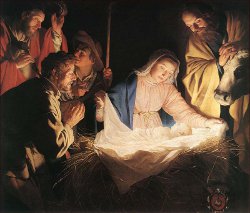Christmas from a Shepherd's Perspective

A little more than 2,000 years ago, “When the fullness of the time had come, God sent forth His Son, born of a woman, born under the law” (Gal. 4:4, NKJV). It was exactly the right time, as predicted by Daniel (cf. 9:25) and confirmed by Jesus (cf. Luke 19:41-44).
It was also the right place—Bethlehem, six miles south of Jerusalem. Seven hundred years earlier, Micah wrote:
But you, Bethlehem Ephrathah,
Though you are little among the thousands of Judah,
Yet out of you shall come forth to Me
The One to be Ruler in Israel,
Whose goings forth are from of old,
From everlasting. (Mic. 5:2)
The time was right, the place was right, and the circumstances were right. It was not to the high and mighty in Israel that the first coming—the incarnation—of Messiah/Christ was celebrated by “a multitude of the heavenly host” (Luke 2:13) in heaven and on earth. It was to a group of lowly “shepherds living out in the fields, keeping watch over their flock by night” (Luke 2:8).
There was no occupation lower than being a shepherd in those days. A thousand years earlier, David, the youngest of eight children, was assigned that humble and dangerous task by his father Jesse (cf. 1 Sam. 16:10, 11). It involved sleepless hours during cold nights on a grassy hillside, sometimes threatened by wild animals. As he explained to King Saul: “Your servant used to keep his father’s sheep, and when a lion or a bear came and took a lamb out of the flock, I went out after it and struck it, and delivered the lamb from its mouth; and when it arose against me, I caught it by its beard, and struck and killed it” (1 Sam. 17:34, 35). Jesus explained that a mere hireling would not do this: “But a hireling, he who is not the shepherd, one who does not own the sheep, sees the wolf coming and leaves the sheep and flees; and the wolf catches the sheep and scatters them. The hireling flees because he is a hireling and does not care about the sheep” (John 10:12, 13).
When Jesus was born in Bethlehem, the shepherds nearby were not mere hirelings. See how they responded to the heavenly announcement: “So it was, when the angels had gone away from them into heaven, that the shepherds said to one another, ‘Let us now go to Bethlehem and see this thing that has come to pass, which the Lord has made known to us.’ And they came with haste and found Mary and Joseph, and the Babe lying in a manger” (Luke 2:15, 16).
These men were humble and obedient servants of God! But that was not the end of their response to the angelic proclamation.
“Now when they had seen Him, they made widely known the saying which was told them concerning this Child. And all those who heard it marveled at those things which were told them by the shepherds” (Luke 2:17, 18). They became the first missionaries of the Good Shepherd (cf. John 10:11). We can only wonder: How far did they travel? How many Jews heard their message? How many of them lived to experience the Day of Pentecost and to become members of His body and bride—the church?
There was one great advantage in being a shepherd. Like very few of us, they had time at night to look up into the starry heavens and wonder:
When I consider Your heavens, the work of Your fingers,
The moon and the stars, which You have ordained,
What is man that You are mindful of him,
And the son of man that You visit him? (Ps. 8:3, 4)
The very first reason God created the sun, the moon and the stars is that they might serve as “signs” for us of His glory (Gen. 1:14).
Like those shepherds of long ago, may we today, in our artificially illumined world, just stop and look at His universe around us. Let us turn off the radio, the TV and the Internet long enough to hear Him speak to us through His written Word. Then we, like those men, might experience the joy of making known to those around us the incomparable message of salvation through Christ the Lord.
John C. Whitcomb Bio
Dr. John C. Whitcomb is heard weekly on Encounter God’s Truth, a radio and Internet broadcast outreach of Whitcomb Ministries, Inc. He has been a professor of Old Testament and theology for 60 years and is widely recognized as a leading biblical scholar. The book he coauthored with the late Dr. Henry Morris in 1961, The Genesis Flood, has been credited as one of the major catalysts for the modern biblical creationism movement. Dr. Whitcomb’s broadcasts, sermons, lectures and writings are available at SermonAudio. To receive the very latest on his ministry, see Facebook.
- 180 views


Discussion